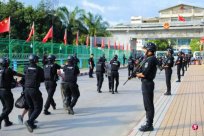77 National Group (G77) and the China Summit passed the Havana declaration on Saturday to oppose the unfair practices of scientific and technological monopolies and other hinders to the development of technology development in developing countries, and emphasize that it should not restrict the acquisition of information and communication technology materials, equipment and equipment, equipment and equipment in developing countries.technology.
The analysis of scholars interviewed, the declaration highlights China's influence in developing countries, but it is expected to have a little impact on the formulation of rules in the international high -tech field.
77 National Group and the China Summit were held in Havana, the capital of Cuba from the 15th to 16th.In the context of the continuous heating of the competition between China and the United States, the theme of this summit is set as "the challenges facing the current development: the role of science, technology and innovation."
G77 and China issued the Havana Declaration (hereinafter referred to as a declaration) on Saturday (September 16), of which 46 of which clearly oppose restrictions on developing countries to acquire technology and technology monopolies.
Declaration opposes the unfair practices of scientific and technological monopolies and other hinders to the development of technology development in developing countries, and urges "countries with monopoly and dominant positions in the field of information and communication technology".As a tool to restrict and suppress the legal economic and technological development of other countries.Declaration also calls on the international community to jointly create an open, fair, inclusive, non -discriminated scientific and technological development environment.
Another clause of the declaration emphasizes that "in order to maintain sustainable development, it should not limit developing countries to obtain information and communication technology materials, equipment and technology."
G77 is the world's largest cooperation mechanism for developing countries. There are more than 130 members. Its official website lists China as a member country, but Beijing officially claims that China is not a member of G77.Cuba is the rotating chairman of the G77. Other members include Brazil, Venezuela and other Latin American countries, as well as Iran.
Declaration of "the major challenges brought by the current unfair international economic order to developing countries, at the current most acute degree", said that its guidance includes geopolitical tension, unilateral compulsory measures, etc.factor.
Wang Zhisheng, former Secretary -General of the China Asia -Pacific Elite Exchange Association, accepted an analysis of the United Zaobao interview. Some of the contents of the declaration in the declaration refer to the meaning of the United States. Part of the reason is that Cuba is a rotating country.powerful.This also shows that China has certain supporters in scientific and technological issues, and Beijing sought to show their influence from developing countries in the Western world.
Analysis: Provide asthma space for the development of Chinese science and technology
Li Xi, a member of the Standing Committee of the Political Bureau of the Communist Party of China and secretary of the Central Commission for Discipline Inspection, attended the G77 and China Summit as a special representative of China.This is the highest -level officials sent by China for many years for the G77 series conference. It is highlighting that China is stepping up to strengthening and developing countries in developing countries in the context of China and the West.
Li Xi also visited Cuba, Brazil and Egypt from September 16th to 26th.Venezuela President Madro and Zambia President Chichema visited China in the past week, both of which are members of the G77.
Li Xi did not name the United States during his speech at the summit that "some countries engaged in unilateral sanctions, detachable chains, and seriously damaged the right to develop rights and space in developing countries."A member of the 77 National Group builds a community of destiny in the world. "
Wang Zhisheng pointed out that most advanced technology and technology are currently in the hands of advanced countries. In terms of high -tech technology standards and rules, China and developing countries have no great influence.However, if China stands in the market in the field of science and technology, it can make some asthma space for Chinese technology companies in the future. "For example, Huawei has a restriction on the Western market, and it can still expand the market of developing countries."Essence



